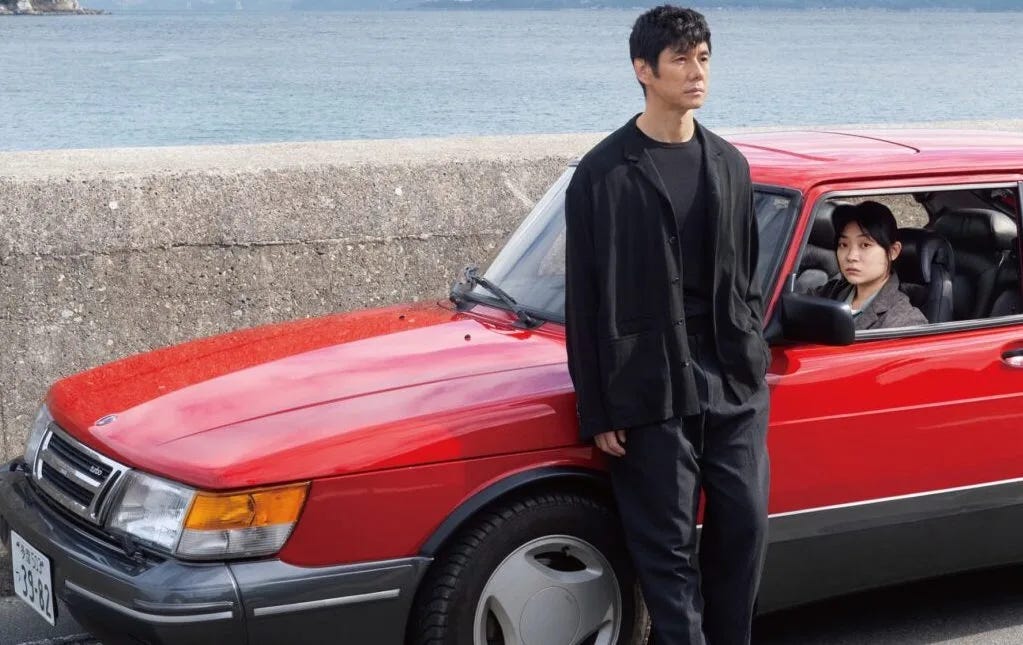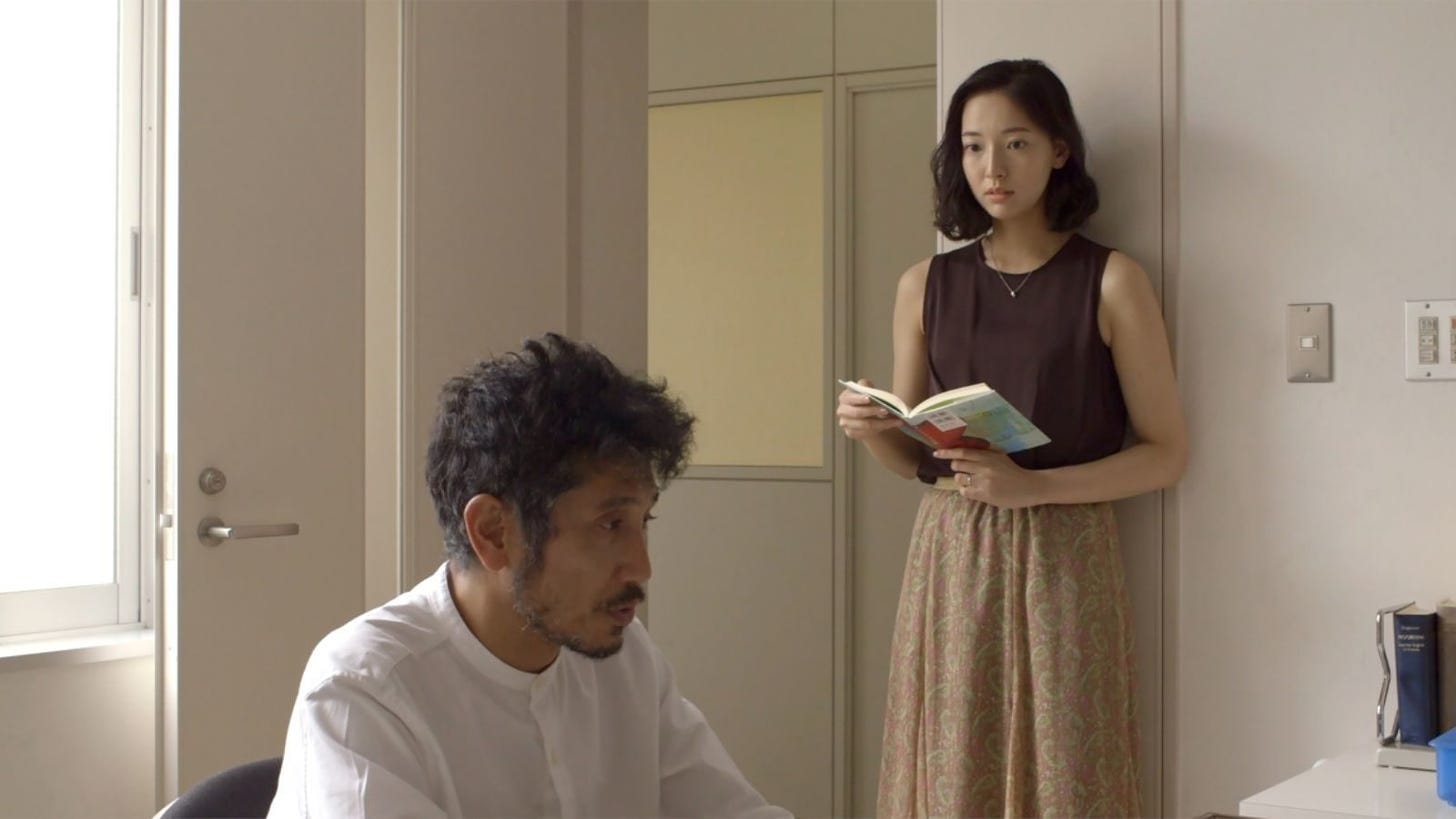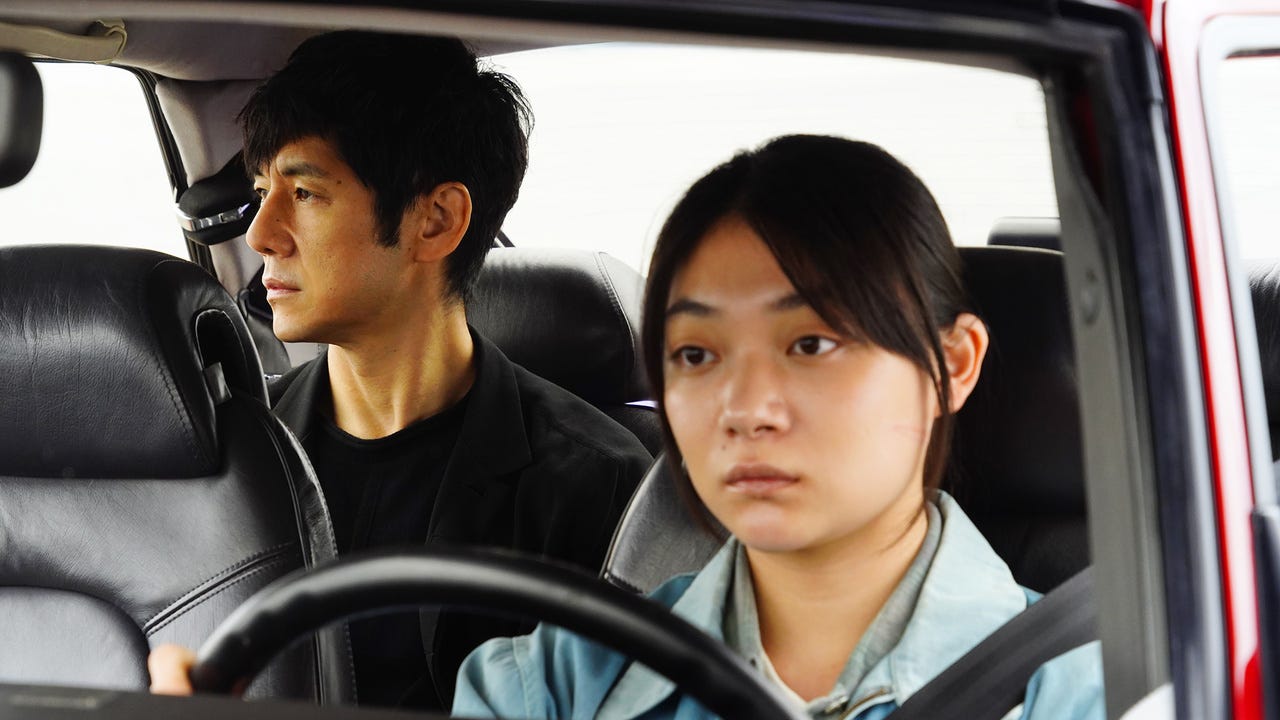The Year of Hamaguchi
With 'Wheel of Fortune and Fantasy' and 'Drive My Car,' Japanese director Ryusuke Hamaguchi has made two of the best films of 2021.
Ryusuke Hamaguchi’s 2018 drama Asako I & II is engineered around a single dramatic moment that feels like a cross between the structural experimentation of Hong Sang-soo and the cosmic coincidences of Krzysztof Kieslowski. In the first part of the film, the pretty yet uncertain Asako (Erika Karata) falls hard for Baku (Masahiro Higashide), a roguish bad-boy type with a shaggy mop of hair who occasionally takes DJ gigs, but mostly drifts around, living entirely in the moment. One day, he simply disappears, leaving Asako confused and devastated. Two years later, while working at a coffee shop, she meets Ryohei, a salesman who looks exactly like Baku (and is played by the same actor), but whose temperament is the opposite. He’s an earnest, buttoned-down type who cares deeply for Asako, and the two eventually settle into a happy, conventional domestic life. Then Baku unexpectedly reemerges.
I won’t spoil the choice Asako winds up making between Baku and Ryohei, but the premise is a great distillation of the questions Hamaguchi asks in his films: What do we really know about ourselves? What do we know about each other? And what happens when we reach moments of revelation, when we must actually face the answers to those questions?
There’s a feeling that Hamaguchi’s work evokes—clear yet complex, simple yet irreducible. Asako does indeed make a choice between broad types, the nice guy versus the rebel, but the film is richer than that binary impulse. There’s more to her than that, an internal struggle about what she wants from her life and how best to share it with someone else. All else being equal—keep in mind, these guys look exactly the same and are played by the same actor—she’s really confronting her own sublimated desires. A certain passivity has caused her to fall into both of these relationships, and now the narrative gods are forcing her to take action. She learns about herself at the same time we do.
The Reveal is a reader-supported newsletter dedicated to bringing you great essays, reviews and conversation about movies (and a little TV). While both free and paid subscriptions are available, please consider a paid subscription to support our long-term sustainability.
Hamaguchi isn’t an especially prolific director, but thanks to COVID-19 wreaking havoc of production and release schedules, he has made two of the best films of 2021: Wheel of Fortune and Fantasy, an exquisite triptych of stories around themes of coincidence and shared fictions, and Drive My Car, a three-hour expansion of a Haruki Murakami short story about grief and the artistic process. Though each has its own separate concerns and is specifically rendered in terms of period and locale, they feel like they take place in the same universe, much like the films of Eric Rohmer or John Cassavetes, to cite two of Hamaguchi’s many influences. Hamaguchi’s world is full of unlikely happenings and odd collisions between characters—a wheel of fortune and fantasy, as the title says—but there’s something more that binds them, a transfixing vibe that feels intuitive and mysterious, even as the narratives themselves are carefully and deliberately plotted out.
The three stories in Wheel of Fortune and Fantasy are all about love and loss, and major inflection points that set the course of its characters’ lives: “Magic (or Something Less Assuring)” is about Meiko, a model (Kotone Furukawa) who listens intently as her best friend (Hyunri) talks about a magical evening she had with man that Meiko realizes is her ex-boyfriend Kazuaki (Ayumu Nakajima). Some of the specifics of her friend’s recollections drum up old feelings, enough so that Meiko winds up confronting Kazuaki at his office. The story is like a reworking of Asako I & II: Does Meiko betray her friend by falling back into an old relationship or is she able to let it go? Hamaguchi stages that choice in a completely unexpected way, even as he circles back to that same question of what people find out about themselves when they’re forced to make a decision.
The second and strongest of the three stories, “Door Wide Open,” is about the clash between integrity and temptation, constructed around a scheme devised by a student seeking revenge on the French professor he blames for short-circuiting his dream of becoming a TV journalist. The student persuades his lover, a slightly older married woman named Nao (Katsuki Mori), to honeytrap the professor into an embarrassing scandal that would ruin his career as a respected academic and novelist. When Nao gets to his office, her efforts are rebuffed, even as she reads a long passage from the professor’s book that’s full of erotic passion and surely reflects the repressed desires of its author. This long scene is a high-wire act where Nao and the professor are using a piece of fiction to discover important things about themselves—an idea that surfaces repeatedly in Drive My Car—but better still is a coda years later that makes clear the upheaval this incident has wrought on the lives of all three characters. And it’s not over yet.
The third entry, “Once Again,” is a foray of sorts into science fiction, at least insomuch as Hamaguchi needs it. In his 2019, a computer virus has caused such a comprehensive global breach of data that everyone’s digital secrets are out in the open and society has gone back to the days of telegrams and postage. Besides that, there’s scant difference between this reality and the one we currently occupy, other than the fact that people with tech jobs, like Natsuko (Fusako Urabe), are on unemployment and relationships are in flux. In this context, Natsuko goes back to her hometown for a 20-year high-school reunion in which she hopes to see an ex-lover, but winds up making awkward chitchat instead. En route to a train ride out of the city, she recognizes a woman on an escalator she believes to be her ex, but the two are in for an altogether stranger afternoon than they might have imagined—one that recalls part of the famous exchange at the end of Who’s Afraid of Virginia Woolf? (“Truth or illusion, George, you don’t know the difference.”) without necessarily following up with the response (“No, but we must carry on as though we did.”).
Hamaguchi’s work comes in all shapes and sizes: His international breakthrough, 2015’s Happy Hour, runs 317 minutes, while the short stories in Wheel of Fortune and Fantasy vary slightly in length but come together in a little under two hours. But there’s never a sense that Hamaguchi is playing temporal games with the audience—he’s distilled his ides to their essence, and they simply require different lengths, not unlike a fiction writer whose work varies from doorstop novels to short-story collections. Yet it wouldn’t be right to think about Wheel of Fortune and Fantasy as an odds-and-sods anthology of disconnected stories, either, despite the lack of narrative overlap between them. In all three, Hamaguchi is spinning delicate twists of fate around matters of the heart, giving each the lightness and deftness of Kieslowski or Wong Kar-wai at their best.
Drive My Car is another beast entirely, though even at three hours, Hamaguchi has divided it up into a few distinct sections that may not be short stories, but feel digestible, like courses in a meal. The appetizer here is what appears at first to be a happy (and sexy) romantic and creative partnership between Yusuke (Hidetoshi Nishijima), a renowned theater director, and his wife Oto (Reika Kirishima), a television writer. Yusuke and Oto are shown in bed together, where their lovemaking becomes a weirdly fertile source for Oto’s scripts, which they then talk through in the morning. This ritual will pay off in devastating fashion much later, but first two major events happen in short order: Yasuke catches Oto in flagrante with a young actor, Koshi (Masaki Okada) and, later, she dies suddenly of a cerebral hemorrhage.
Oto’s death throws Yasuke into numbing grief, compounded by another tragedy that has haunted their relationship, and it follows him a couple years forward in time, when he’s agreed to stage a production of Uncle Vanya in Hiroshima. As part of his residency, the theater requires him to have a driver, a condition Yasuke doesn’t accept easily, because part of his process is to spend the long commute on the solitary process of running lines recorded on tape. But the more time he spends with his quiet and expert driver, Misaki (Toko Miura), the better he feels about the arrangement. He finds that he can now focus on the challenges of the play itself, in which he’s cast, among other actors, Koshi, who is reeling from an unidentified scandal that’s bringing him unwanted attention in public spaces.
Yasuke’s casting of Koshi seems at first like an act of hostility, especially when he deliberately miscasts him as Vanya, but in typical Hamaguchi fashion, he’s really seeking information about his wife—and, by extension, himself. The longer it unfolds, the more layers Drive My Car reveals: the meaningful allusions to Chekhov, the tragedies that bind very different people like Yasuke and Misaki, a rigorous acting process that reputedly mirrors Hamaguchi’s own work with his cast, the way a work of art like Uncle Vanya can wrench truths from those who perform it. Everything feels like a surprise, from what Yasuke really learns about his wife from Koshi to a rehearsed scene between minor performers in smaller roles that hums with fresh emotion, justifying the ardors necessary to make it happen.
And so, too, the ardors of Drive My Car, though Hamaguchi makes those easy to withstand, because he’s so attentive to the performances and to the overall rhythm of his work. At one point, Yasuke waxes poetic about the quality of Misaki’s driving. “She speeds up and slows down so smoothly,” he says, “I hardly feel gravity. Sometimes I forget I’m in a car.” Hamaguchi probably didn’t intend to go fishing for compliments with that—though he has made a film about a director—but the experience of Wheel of Fortune and Fantasy and Drive My Car feels similar. They bring you to wondrous destinations without lurching toward them.
Wheel of Fortune and Fantasy is still rolling slowly around the country. Drive My Car is only just starting to move slowly around the country. It opened at Film Forum and Lincoln Center in New York last week and will open in Los Angeles and Montclair, New Jersey on Friday.







So I’ve never seen a Hamaguchi film but am extremely interested in his work. I doubt I’ll get to see either of these until they hit streaming, but looking at his back catalogue, I have a question:
Asako I & II seems like a good starting point because it’s acclaimed and reasonably easy to find. Not to mention his other most acclaimed film, Happy Hour, is over 5 hours long - a tough sell even if great.
However I see that he also has a ton of earlier films that almost seem to not exist. They also all have fairly bad IMDB scores (not that I respect IMDB, but anything under a 6 when it’s this tough to see seems odd).
Does anyone have any advice on which of Hamaguchi’s film’s I should seek out besides Drive My Car and Wheel of Fortune?
Really nice read. I've been interested in Hamaguchi since everyone went nuts for Happy Hour. Looks like in the US that and Asako I & II remain the only ones accessible. Normally I like to start as early in the filmography as I can with a filmmaker but the 5.5 hour runtime is too much for a director I haven't seen before, and it appears I missed Wheel during its run at the Siskel Center.
I'll have to decide whether to watch Asako at home soon, or go into Drive My Car when it opens next week here in Chicago blind to Hamaguchi—other than reading this essay of course.